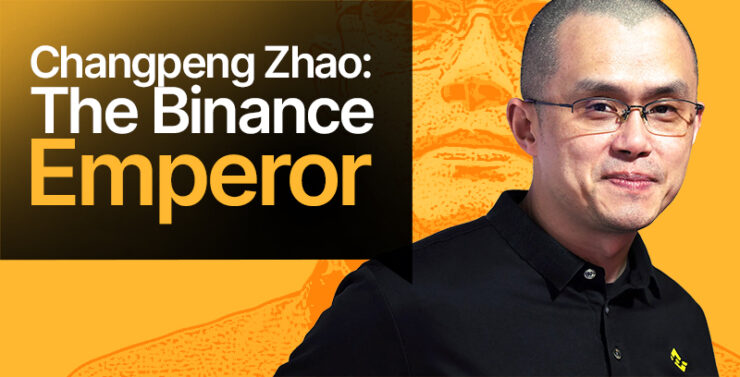Changpeng Zhao, commonly called CZ, built the world’s largest cryptocurrency exchange in less than eight months after its July 2017 launch, amassing a personal fortune of $66.6 billion by January 2025. The Chinese-born Canadian entrepreneur grew Binance from a $15 million initial coin offering into a platform handling roughly half of all global spot cryptocurrency trades by 2023.
However, his rise from flipping burgers at McDonald’s to crypto billionaire came to a dramatic pause in November 2023 when he resigned as CEO after pleading guilty to money laundering charges. The legal settlement required Zhao to pay a $50 million fine while Binance paid $4.3 billion in penalties, marking one of the largest corporate settlements in U.S. history.
Born in 1977 in Lianyungang, China, Zhao moved to Vancouver at age 12 after his father, a university instructor, was politically persecuted as a “pro-bourgeois intellectual.” His teenage years in Canada included overnight shifts at gas stations and McDonald’s to support his family. Zhao studied computer science at McGill University, preparing him for his future tech career.
His professional life began at the Tokyo Stock Exchange, where he spent four years developing software for matching trade orders. He moved to Bloomberg Tradebook for another four years focusing on futures trading software. In 2005, Zhao founded Fusion Systems in Shanghai, creating high-frequency trading software for global banks.
“I first heard about Bitcoin in 2013 when playing poker with Bobby Lee,” Zhao revealed in statements documented by multiple sources. Following this introduction, he made a decision his family considered reckless – selling his Shanghai apartment to invest everything in Bitcoin when it traded at approximately $600 per unit.
Creating a Crypto Trading Powerhouse
Zhao launched Binance in July 2017 after raising $15 million through an initial coin offering. The exchange began trading just eleven days later, showcasing the technical efficiency that would become its hallmark. By February 2018, Forbes recognized Zhao’s meteoric rise, placing him third on their list of “The Richest People In Cryptocurrency” with an estimated net worth between $1.1-2 billion.
The exchange’s success came from multiple competitive advantages. Binance offered substantially lower fees than competitors, supported more than 360 cryptocurrencies, and created its own utility token called Binance Coin (BNB). Users received trading fee discounts when using BNB, driving adoption of both the token and platform.
By August 2023, Binance served more than 150 million users globally. Its revenue reached an estimated $9.8 billion, according to Bloomberg data, making it larger than its four biggest competitors combined. The platform’s trading volume grew to handle approximately 50% of all spot cryptocurrency trades worldwide.
Unlike traditional financial institutions, Binance operated without a fixed headquarters, adapting to regulatory environments by moving from China to Japan, then Malta, and eventually establishing Zhao in Dubai. This nomadic corporate structure allowed rapid expansion but eventually contributed to its regulatory challenges.
Legal Troubles and Leadership Change
Binance’s growth-focused approach ultimately collided with international financial regulations. In March 2023, the Commodity Futures Trading Commission filed a lawsuit against Binance and Zhao, alleging willful evasion of U.S. law and breaches of derivatives rules. The SEC followed in June 2023 with 13 additional charges related to securities violations.
Internal communications revealed in court filings showed concerning statements about transactions potentially linked to criminal organizations. The company faced accusations of failing to implement proper anti-money laundering controls while prioritizing rapid expansion over regulatory compliance.
“This filing is unexpected and disappointing as we have been working collaboratively with the CFTC for more than two years,” a Binance spokesperson stated after the CFTC lawsuit. Nevertheless, the legal pressure intensified throughout 2023.
In November 2023, Zhao reached a settlement with U.S. authorities, pleading guilty to violating the Bank Secrecy Act. He stepped down as CEO, paying a $50 million personal fine while Binance agreed to a $4.3 billion penalty. Richard Teng replaced him as CEO while Zhao retained majority ownership of the company.
A federal judge sentenced Zhao to four months in prison in April 2024, rejecting prosecutors’ request for a three-year term. Unlike many white-collar offenders, his non-U.S. citizenship made him ineligible for minimum-security confinement. Federal records show he completed his sentence and was released on September 27, 2024.
Life Beyond Binance Leadership
Despite his legal setbacks, Zhao maintains substantial wealth and influence in the technology sector. His conversations with OpenAI CEO Sam Altman in late 2023 suggested interest in artificial intelligence investments. Court filings revealed his intentions to fund biotech research “with the aim of curing diseases once and for all.”
Zhao launched Giggle Academy, a nonprofit offering free K-12 education through gamified learning. “No revenue,” he noted about the venture, emphasizing its philanthropic nature. He has stated intentions to donate up to 99% of his wealth, following examples set by Bill Gates and Warren Buffett.
The entrepreneur maintains his minimalist philosophy despite his billions, reportedly avoiding typical wealth symbols like houses and luxury cars. His continued majority ownership of Binance ensures his influence in cryptocurrency markets remains substantial even after stepping away from day-to-day operations.





